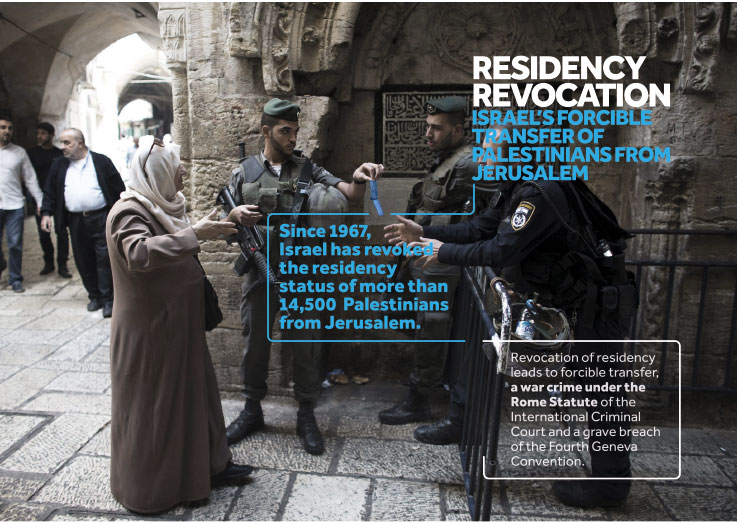About the initiative
Seven Palestinian organizations (Community Action Center – Al-Quds University, Jerusalem Legal Aid Center, the Society of St. Yves, Al-Haq, BADIL Resource Center for Palestinian Rights and Refugee Rights, the Civic Coalition for Palestinian Rights in Jerusalem, and Al-Shabaka) collaborated with Visualizing Palestine to create a series of visuals on the situation in occupied East Jerusalem. The graphics aim to raise awareness of Israel’s apartheid policies in the city, its effects on the Palestinian population, and the gross violations of international humanitarian and human rights law that arise as a result of such policies.
Introducing the second visual
Residency Revocation: Israel’s Forcible Transfer of Palestinians from Jerusalem
Under international law, East Jerusalem is considered an occupied territory, and the de facto annexation of the city by the Israeli government is considered illegal. Throughout its occupation, Israel has enacted discriminatory laws and policies to diminish the presence of the Palestinian population in East Jerusalem. Jerusalemite Palestinians are granted a “permanent” residency status to live in Jerusalem, but the conditions and policies associated with this practice have rendered entry into and residency in Jerusalem a revocable privilege rather than an inherent right.
The second infographic focuses on the unlawful Israeli policy of residency revocation that targets Palestinians from Jerusalem. The revocation of permanent residency status is the most direct tool used to forcibly transfer Palestinians from occupied East Jerusalem, so that a Jewish-Israeli majority can be maintained in the city.i Since 1967, Israel created and has consistently expanded the criteria for revoking the residency status of Palestinians, leading to the revocation of the residency rights of more than 14,500 Palestinians from Jerusalem to date.
The policy was developed in three main phases.
1967–1995: A Palestinian can lose his or her residency status by “living outside Israel” (and East Jerusalem) for a period of seven years, or by receiving the status of resident or citizen in another country.
1995–ongoing: The aforementioned criteria were broadened so that Palestinians may lose their residency status by moving their “center of life” outside of Israel or East Jerusalem, even if they were residing abroad for less than seven years and did not obtain residency status or citizenship from a foreign country. If individuals reside in the West Bank (excluding East Jerusalem) and the Gaza Strip, Israel considers them to be “residing abroad” and can revoke their Jerusalem residency status. Since the implementation of this policy in 1995, Israel has revoked more than 11,500 residence permits.
2006–ongoing: In addition to the center-of-life policy, the Israeli Minister of Interior also began punitively revoking the residency status of Palestinians on the basis of a “breach of allegiance.” Consequently, Palestinians who have never left Jerusalem become vulnerable to residency revocation.
Residency revocations, including punitive revocations, flagrantly violate international humanitarian law and international human rights law. Revocation of residency leads to forcible transfer, a war crimeii under the Rome Statute of the International Criminal Court and a grave breach of the Fourth Geneva Convention.iii As the revocation forms part of a widespread and systematic policy to transfer the protected Palestinian population, it may also amount to a crime against humanity.iv
i The Israeli Minister of Interior has discretionary powers to revoke the residency rights of Palestinians from Jerusalem (Section 11(a) of the Entry into Israel Law).
ii Article 8 of the Rome Statute of the International Criminal Court.
iii Articles 49 and 147 Fourth Geneva Convention.
iv Article 7 of Rome Statute


